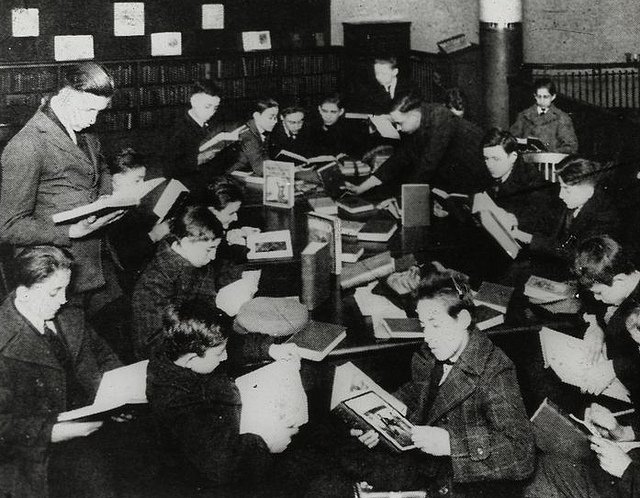No longer wanting to be that guy who can’t look up from his phone and acknowledge the existence of a fellow human being on the sidewalk, I made a vow to myself that I would no longer walk and read at the same time.
But that just meant squeezing reading into other nooks and crannies of the day. Pocket, which gloriously feeds my addiction to reading articles, recently informed me that I read the equivalent of 110 books on their app in 2017.
As far as addictions go, it could be worse. Reading is great, and we live in a seems-too-good-to-be-true world where great writing is available at our fingertips for free.
Years ago, I started sharing with family and friends a list of my favorite articles from the past year. More recently, I’ve shared my lists with The Jesuit Post in 2016, 2015, and 2014.
Here are my faves from 2017 in no particular order:
1) Can Our Democracy Survive Tribalism?, Andrew Sullivan, New York
This was the article I found myself talking about most at the dinner table (apologies to my community!). Sullivan is on my best-of list almost every year. This is another masterpiece. Sullivan comes out swinging at our self-contradictions, and few – on any point along the political spectrum – can read this without feeling personally challenged:
So many severe critics of George W. Bush’s surveillance policies became oddly muted when Obama adopted most of them; Democrats looked the other way as Obama ramped up deportations to levels higher than Trump’s rate so far. Republicans, in turn, were obsessed with the national debt when Obama was in office, despite the deepest recession in decades. But the minute Trump came to power, they couldn’t be more enthusiastic about a tax package that could add trillions of dollars to it. No tribe was more federalist when it came to marijuana laws than liberals; and no tribe was less federalist when it came to abortion. Reverse that for conservatives. For the right-tribe, everything is genetic except homosexuality; for the left-tribe, nothing is genetic except homosexuality.
2) My Family’s Slave, Alex Tizon, The Atlantic
Readers online spent more time reading this essay than any other article online in 2017. It is incredible. If you have contributed to the 58,000,000 minutes readers have engaged this essay, I highly recommend it. It’s tragic. It’s honest. It’s simply great writing.1
3) Christ in the Garden of Endless Breadsticks, Helen Rosner, Eater
The first two articles on my list are pretty heavy. This is not. But it’s solid, and I love that title. It creatively integrates the two most famous olive gardens – Gethsemane and the restaurant chain – in a thoughtful reflection on nostalgia, non-places, and comfort food. Rosner writes:
Olive Garden is a machine of memory. You go to Olive Garden because you’ve always gone there. You bring your children there, and they grow up having always gone there. It is a restaurant that’s good at some things, a few of them on the menu, more of them about price and convenience and a general exhausted tolerance for unruly children and arguing couples. It is extraordinarily good at being a non-place. It’s uncannily good at being itself: A restaurant that calls on Italy without ever looking at Italy, that promises family without community, that is — in its ubiquity — nowhere, and is better for it. Every time it strays from itself, the collective force of memory intervenes, and it returns.
4) He’s 22. She’s 81. Their Friendship Is Melting Hearts. Daniel Victor, New York Times
This article will make you feel better about humanity. A 22-year-old rapper from Harlem and an 81-year-old retired woman from Florida are an unlikely pair, but their friendship forged from playing Words With Friends makes 2017 seem just a little more hopeful.
5) United Airlines Isn’t the Problem – It’s Good People Doing Nothing, Ryan Holiday, Observer
Ryan Holiday makes me feel bad about myself in that he is younger than I am but ten times as wise. He has written extensively about Stoicism, and this article is a modern-day application of Marcus Aurelius’s maxim, “Waste no more time arguing what a good man should be. Be one.” During the unity-in-outrage over the doctor who was dragged off the United flight, Holiday wrote:
The world doesn’t need another person talking on social media about what needs to be done. It needs more people doing it. Nothing major even. Just the little stuff: Being nice. Stepping in. Lending a hand. Drawing a line. Standing up.
6) Losing It in the Anti-Dieting Age, Taffy Brodesser-Akner, New York Times
I love anything that Taffy Brodesser-Akner touches. Her essay on the church of Justin Bieber was on my best-of list in 2015, and this essay is even better. I find myself learning about the human experience through her thoughtful, confessional writing.
7) The Coddling of the American Mind, Greg Lukianoff and Jonathan Haidt, The Atlantic
Trigger warning: This essay lambasts trigger warnings. This essay opened my eyes – and raised my alarms – to how college campuses have changed in the ten years since I graduated. Lukianoff and Haidt write:
Rather than trying to protect students from words and ideas that they will inevitably encounter, colleges should do all they can to equip students to thrive in a world full of words and ideas that they cannot control.
Haidt has written a number of articles in recent years expressing similar concerns. His recent essay on younger kids with Lenore Skenazy, “The Fragile Generation,” is just as thought-provoking.
8) Don’t Let Facebook Make You Miserable, Seth Stephens-Davidowitz, New York Times
“Compare and despair.” If we compare our imperfections with the way others can appear on social media, it is all too easy to feel terrible about ourselves. This article is immensely helpful – and hilarious. Stephens-Davidowitz contrasts what people post on social media with what they (anonymously) search for on Google. It turns out that we’re all a mess. He writes:
Any time you are feeling down about your life after lurking on Facebook, go to Google and start typing stuff into the search box. Google’s autocomplete will tell you the searches other people are making. Type in “I always…” and you may see the suggestion, based on other people’s searches, ‘I always feel tired” or “I always have diarrhea.” This can offer a stark contrast to social media, where everybody “always” seems to be on a Caribbean vacation.
9) I spent a week with 8,000 worshippers of the fake, fantastical cult of zumba, Amy Wang, Quartz
I was once persuaded to “ditch the workout, join the party” and participate in a Zumba class. It involved more hip-shaking than a Shakira video, and I haven’t had the courage to go back. Still, I find the massive growth of Zumba to be fascinating – and something that the church could learn from. This “party” is clearly connecting with people today. Wang writes:
If going to church called for sweatbands instead of prayer books, salsa music in the place of scripture, and a near-insane amount of neon, it might look something like this.
For another article that highlights the ways a workout craze has parallels with religion, check out “The Church of CrossFit.”
10) Darwin Was a Slacker and You Should Be Too, Alex Soojung-Kim Pang, Nautilus
I have always loved power naps. After this article – and Pang’s book Rest: Why You Get More Done When You Work Less – I no longer feel guilty about taking them. Pang’s work made a more positive difference on my life than anything else I read this year. The “deliberate rest” that Pang describes, especially when coupled with deep work, was a recipe for success when writing my thesis.
Those are some of my favorites from 2017. What about you? Please share your own recommendations. And happy reading!
-//-
Cover image courtesy FlickrCC user jwyg, found here.
- Plus, this essay is David Brooks approved. ↩


